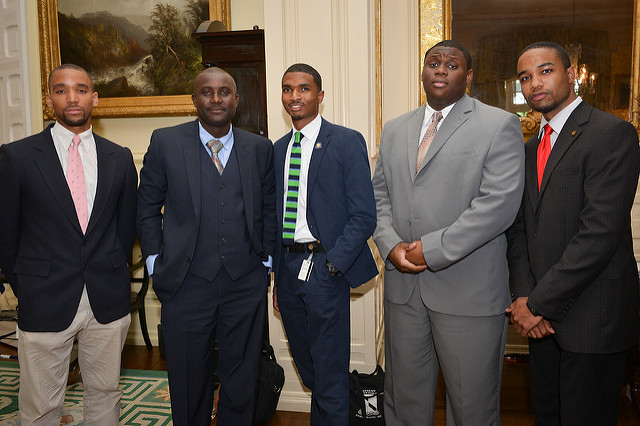Diverse Conversations: Supporting Underserved Populations in Higher Education
The field of higher education has changed completely in the past couple of decades. Unlike before, when only a few talented and intelligent students went on to get a college education, now it has become a necessity as the jobs available in the new economy require more than just a high school diploma. Because of this, American institutions of higher learning are experiencing an influx of students that may not have been part of the college scene as early as a decade ago. Recently, I sat down with Dr. Stella M. Flores, Assistant Professor of Higher Education at Vanderbilt University, to discuss how institutions of higher learning can better support underserved populations.
ML: How are first-generation, low-income, and minority students faring in the modern academy in relation to the past? How can we get things to where they should be?
SF: The trends show that we have more access to higher education due to increased options via the community colleges and now online learning programs. So the modern academy does not look like an older traditional academy. However, when we account for other characteristics, the demographic trends are less favorable. We are not doing as well with some groups such as Hispanics, while we’ve seen some improvements with other groups.
First-generation, low-income and minority students fare better when they have adequate access to financial aid, support programs that properly introduce them to and sustain them through the academy, and proper high school preparation that equips them to handle the rigor of college work. The reality is that many of the high schools that launch these students have not provided this preparation placing the burden on the academy to make up for this lost ground.
ML: What can policy and decision makers do to help historically underserved students to succeed in college?
SF: First, policymakers and decision makers can come to the table as stakeholders in support of educating underserved students as a larger societal and economic mandate. Educational attainment is beyond an individual good yet we behave as if it is a zero-sum game in almost every instance. Second, succeeding in college is largely based on succeeding in high school. While it seems that aiming for the high school diploma is no longer a problem, the new battle, it seems to me, is an equity fight for the courses that lead to reasonable and serious college eligibility for all groups.
Some states have enacted policies to make the college curriculum a default curriculum. This is a great step but we have to know when policy is not enough. Stakeholders as a group can identify what levers will also have to be in place for the policy to work. Policy is an essential but insufficient step in helping students succeed in college. I would also argue it also not only the responsibility of education policymakers as health care, family, and employment decisions are especially competing options in low-income and underrepresented student lives.
At the college level, I would suggest the funding and expansion of interventions we know work for students based on their institutional culture. Institutions that enroll a moderate to high percentage of students in need of remediation will require different interventions than an institution with innovative retention programs for students with the preparation and motivation to major in a STEM field.
Third, reducing time to degree to the extent possible, will likely be a key element in all of these programming efforts. Fourth, many highly successful historically underrepresented students will point to at least one minority faculty who made a difference in their pathway to greater achievements. That is not to say that non-minority faculty members don’t play a role in this pathway to success. However, this is one element that seems to be consistent in the average underrepresented student success story. I know my life would have been different had I not seen the first Mexican-American female professor at my university.
ML: Historically underserved students are disproportionally burdened with student debt when compared to other groups. What can be done to close this gap and alleviate their burden?
SF: There is emerging research on financial literacy on how to plan for college, choose college based on options and loan debt, and the timing of the receipt of this information. One reality, however, is that many students faced with a “first” in completing college, specifically a selective college, take on more debt than they can handle in efforts to make family history. My advice would be to understand the tradeoffs in these decisions.
Second, there are many schools now that offer free tuition to high achieving, low-income students if parental contribution is under a certain amount. The lesson here is to tell the low-income eighth grader that if he or she is able to achieve at high levels, college may be reasonably affordable if not nearly free at a good school. This is of course dependent on the economy and institutional sustainability of programs. However, it seems we are providing incorrect information when we say a public school education will always be cheaper than a private school education.
One good formula to suggest to our younger students is to aim to be academically high achieving, get information on options across all institutions, don’t “undermatch” yourself, and plan to finish in time if at all possible. For those of us with loan debt, I can imagine a new pool of teachers, professors, health care professionals with simple loan forgiveness programs administered at the state or federal level. It seems to me this would be a relatively easy marketing campaign that could change the structure of the labor market in ways the labor market needs to stretch – stronger teachers in the professions, more nurses in our hospitals, etc.
ML: By 2050, Caucasians will no longer constitute a majority in the United States. What does this mean for higher education?
SF: This is an important demographic to keep in mind as we plan for a future. Will we respond with safeguarding stratification at institutions based on race, ethnicity, and income, or will we prepare leaders from all groups for all institutions? In essence, this means state economies will likely thrive or die based on how they educate their least educated group. This will have even more dire consequences for states whose least educated group is also its most populous group.
ML: What is your vision for higher education in the 21st century, and what are the key opportunities and challenges suggested by this vision?
SF: My vision for the 21st century is to more profoundly understand the potential of our individuals and institutions in the context of historical and remaining challenges. By that I mean moving past stereotypes, fears, and anxieties to a place where we have the opportunity to see all groups as equals because we have seen leadership, research, success, and vision from everyone in our circles. In my vision, we won’t second-guess each other’s talents and contributions based on what we look like.
My vision is also to speak up for each other’s educational well-being even if that person is different from ourselves. In sum, we create a vision in which all have an opportunity for a solid high school education that prepares you to succeed in college and a college education that prepares you for a job and dare I say the opportunity to attend a graduate or professional program. The challenge will be to do this in a world with exploding and evolving technology in which the “have-nots” will likely be the last in line to access the future.
Well, that concludes my interview with Dr. Flores. I would like to thank her for taking time out of her busy schedule to speak with us.
Click here to read all our posts concerning the Achievement Gap.




